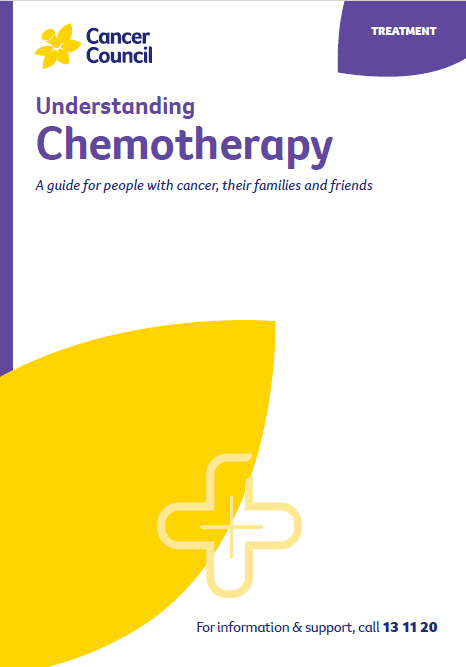- Home
- About Cancer
- Managing side effects
- Sexuality, intimacy and cancer
- Treatment side effects
- Chemotherapy
Chemotherapy
Chemotherapy uses drugs to kill or slow the growth of cancer cells. The drugs are called cytotoxics and they particularly affect fast-growing cells such as cancer cells. Other cells that grow quickly, such as the cells involved in hair growth, can also be damaged.
Side effects of chemotherapy
The side effects of chemotherapy vary depending on the individual and the type and dose of drugs given. Most side effects are short-term and gradually improve once treatment stops, but sometimes chemotherapy causes long-term side effects. Common side effects include fatigue, nausea, vomiting, diarrhoea, constipation, hair loss and mouth ulcers – all of which may affect your self-esteem and desire to have sex.
Sexuality effects
Chemotherapy can also directly affect the hormones linked to libido, but desire for sex usually returns to normal after treatment ends. Some chemotherapy drugs can affect the nerves needed for the penis to become erect, but this is usually temporary.
Fertility changes
Having chemotherapy can lower the levels of hormones produced by the ovaries. This may cause irregular periods – though they often return to normal after treatment. Sometimes chemotherapy can bring on menopause. After menopause, you can’t fall pregnant naturally. If you think that you may want children one day, talk to your doctor about egg-storing options before you start any treatment. As chemotherapy can cause birth defects, use contraception during treatment to avoid pregnancy.
Chemotherapy drugs may lower the number of sperm produced and their ability to move (motility). This can cause temporary or permanent infertility. Talk to your doctor about any sperm preservation options before you start treatment.
Bloating
Chemotherapy for ovarian or bowel cancer can be given as liquid directly into the abdominal cavity (intraperitoneal chemotherapy). This can cause the belly to swell a little, which may affect your body image, but the liquid will drain away after a short time.
Genital effects
Thrush is a common side effect, especially when taking steroids or antibiotics to prevent infection. It can cause vaginal dryness, itching or burning and a whitish discharge (learn tips on how to manage thrush). Chemotherapy for vulvar cancer can worsen any skin soreness from radiation therapy.
Chemotherapy suppresses the immune system, so viruses can thrive where they might otherwise be controlled. This means that genital warts or herpes flare-ups can occur and people who have never had an outbreak may suddenly have one. Talk to your doctor for more advice.
Podcast: Sex and Cancer
Listen to more of our podcast for people affected by cancer
More resources
Dr Margaret McGrath, Head of Discipline: Occupational Therapy, Sydney School of Health Sciences, The University of Sydney, NSW; Yvette Adams, Consumer; Dr Kimberley Allison, Out with Cancer study, Western Sydney University, NSW; Andreea Ardeleanu, Mental Health Accredited Social Worker, Cancer Counselling Service, Canberra Health Service, ACT; Kate Barber, 13 11 20 Consultant, Cancer Council Victoria; Dr Kerrie Clover, Senior Clinical Psychologist, Psycho-Oncology Service, Calvary Mater Newcastle, NSW; Maree Grier, Senior Clinical Psychologist, Royal Brisbane and Women’s Hospital, QLD; Mark Jenkin, Consumer; Bronwyn Jennings, Gynaecology Oncology Clinical Nurse Consultant, Mater Health, QLD; Dr Rosalie Power, Out with Cancer study, Western Sydney University, NSW; Dr Margaret Redelman OAM, Medical Practitioner and Clinical Psychosexual Therapist, Sydney, NSW; Kerry Santoro, Prostate Cancer Specialist Nurse Consultant, Southern Adelaide Local Health Network, SA; Simone Sheridan, Sexual Health Nurse Consultant, Sexual Health Services – Austin Health, Royal Talbot Rehabilitation Centre, VIC; Prof Jane Ussher, Chair, Women’s Heath Psychology and Chief Investigator, Out with Cancer study, Western Sydney University, NSW; Paula Watt, Clinical Psychologist, WOMEN Centre, WA.
View the Cancer Council NSW editorial policy.
View all publications or call 13 11 20 for free printed copies.
Need to talk?
Support services
Coping with cancer?
Speak to a health professional or to someone who has been there, or find a support group or forum
Life after cancer treatment
Webinars, exercise and nutrition, sexuality programs, and back-to-work support
Cancer information
Cancer treatment
More information about cancer treatments, including chemotherapy, radiation therapy and surgery

